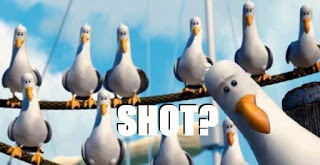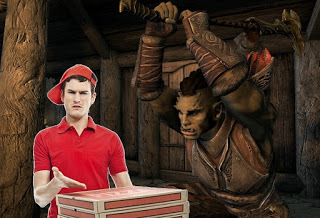Just Call Me Uncle Tusky
 Good Thursday to you, cafe-goers! This week, narrator Andrew McFerrin talks about the process of creating unique character voices for narration, which may or may not sometimes involve research and vocal exercises and video games. Also, orcs, a flock of seagulls, and pizza delivery, in case anyone's feeling peckish. Enjoy!
Good Thursday to you, cafe-goers! This week, narrator Andrew McFerrin talks about the process of creating unique character voices for narration, which may or may not sometimes involve research and vocal exercises and video games. Also, orcs, a flock of seagulls, and pizza delivery, in case anyone's feeling peckish. Enjoy! When I tell people at parties what I do for a living the first question they ask, invariably, is this:
"Uhhh....what?"
But that's not a very interesting question to try to spin off into a blog post, is it? Fortunately the follow-up's usually a bit meatier:
"Do you, like, do all those voices? How do you do that?"
In a party setting the answers to those questions tend to be "Yes" and "I moves my mouth and the soundses comes out" respectively. Because they don't really want an acting class on the spot, they're just making conversation in between rounds of shots in the kitchen and stage combat in the backyard.
 I have interesting friends
I have interesting friendsBut it's a good question, right? How do you voice ten, twenty distinct characters without wardrobe or lighting or makeup or crystal methamphetamine or any of the other tools actors on the big screen have at their disposal? Sure, accents are easy, but that only gets you so far. What if the story is set within the confines of a single family home? Or a mining colony on the dark side of Ganymede populated entirely by robots and clones? Or New Zealand? We're talking about creating characters here, not caricatures.
You have to spend a certain amount of time thinking about what the character's actually like. Inflection's a big part of it. A younger, inquisitive character would tend to speak faster and pitch their voice up toward the end of phrases. Older and wiser? Kind of the opposite. Smarmy suck-up? Have I got the perfect slow, oily drawl for you...
But while it's tempting to make a laundry list of personality traits and assign a vocal component for each one, that still doesn't make a character. And trying to do it like that is a good way to drive yourself nuts. If you want to inhabit the character's attitude, then you need to understand how that character interacts with the world around them.
Let's say you have to voice a major romantic character who also happens to be an orc. Y'all have a pretty good idea what orcs are like, right? Big, gruff, tusks, muscles, usually green, um..."unconventionally attractive", totally within the public domain? Definitely gonna be a deeper voice, probably fairly gravelly, and you'll want to keep your teeth bared and nostrils flared because...well, tusks. Duh.
So we have established the quality of orc-ness. Now, to turn this collection of traits into a character.
How do we do that? We order pizza.
No really, go with it for a second. How would our orc go about procuring something which he wants, but has to rely on someone else to bring to him? How would our orc react to the pizza being delivered late? Is our orc a good tipper? Does our orc have coupons that he forgot to mention when he placed the order?
These sound like some unbelievably stupid questions to be asking, but they're really not. Of course orcs don't order pizza, orcs and pizza generally don't exist within the same literary universes. But you have presumably ordered pizza at some point in your life. You have direct experience of the entire gamut of human emotions involved in pizza-ordering. You have been hungry, too tired to cook, frustrated that it has now been 33 minutes AND OH MY GOD THEY'RE STILL NOT HERE YET. 'cause I know I have been.
 THAT WAS 47 MINUTES WHAT THE SHIT, CHIP?
THAT WAS 47 MINUTES WHAT THE SHIT, CHIP?Now our romantic lead orc probably will not be ordering pizza. But at some point in this story he will feel heightened emotion of some kind. He may not be frustrated about pizza, but he will be frustrated about his inability to connect on a deeper level with the sexy but emotionally distant werebear he's been kicking it with for the last 130 pages and don't even pretend you wouldn't read that book.
The idea here is that you use your own experiences and the emotions that come from them as a conduit to get you into the character's mind. In the booth, I'm not trying to sound like an orc—in that moment, I'm trying to BE an orc.
There is a little piece of my experience in every character I voice, even the ones who are nothing at all like me. I like to think that comes through. I hope it does, anyway.
Also, if anyone wants to author a story involving both orcs and pizza I would totally narrate that so hard.

Find Andy and Falcon Sound Company on Facebook, or at www.falconsoundcompany.com.
And check out Andy's latest narration, "Prelude to Love," by Anne Barwell.
Published on March 22, 2018 06:00
No comments have been added yet.



